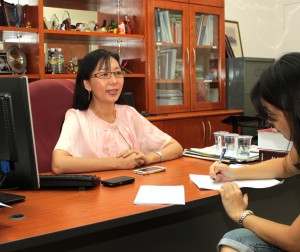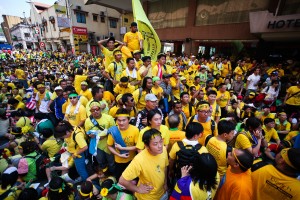Will Najib’s billion dollar scandal hurt his image? What impact will Bersih 3.0 have on the coming general elections? How prepared is PR to retain Selangor? The Rocket’s Chung Hosanna asked Selangor State Senior EXCO and DAP National Organising Secretary Teresa Kok these and other tough questions in an election-centric exclusive interview.
Setting the stage for GE13
 Even before her three terms as Member of Parliament (MP), seasoned politician Teresa Kok has campaigned in several general elections. I asked the DAP National Organising Secretary to gauge the impact of recent developments on the electoral sentiment this time around.
Even before her three terms as Member of Parliament (MP), seasoned politician Teresa Kok has campaigned in several general elections. I asked the DAP National Organising Secretary to gauge the impact of recent developments on the electoral sentiment this time around.
With an estimated 300,000 crowd taking to the streets for Bersih 3.0 on 28th April 2012, Teresa believes that the date of the 13th General Election will be pushed back for the benefit of the ruling government.
“Prime Minister Najib knows (from the 2008 election results) that people want change. That’s why he came up with a series of slogans and programs after becoming PM. However, people don’t see much impact from the publicity blitz, so he has to redouble his efforts.”
The first Bersih rally in 2007 was credited with galvanising national discontent to deal a significant blow to the ruling coalition in the 2008 political tsunami. Five years later, BN’s token reforms have failed to appease the growing public discontent with an inherently flawed electoral process.
Teresa believes that free and fair elections are close to the hearts of the public. She points out that the electoral roll is far from clean, despite boasts by Election Commission Chairman Tan Sri Abdul Aziz Mohd Yusof lately that Malaysia has “the cleanest electoral roll in the world”.
A recent study conducted by the Malaysian Electoral Roll Analysis Project (Merap) found 3.3 million cases of unverifiable votes on the roll.
Of that figure, 65,455 “foreigners” were found to be registered as voters. 75% of these “foreign” voters can be found in the state of Sabah, where problems with foreigners being given fake ICs have been a long documented problem.
Meanwhile, Merap also found that 3.1 million voters’ addresses conflicted with the ones on their ICs and registered constituencies.
Merap Director Ong Kian Ming called this issue “troubling”, as this information was given to the EC by the National Registration Department (NRD) in 2002, before the implementation of the new registration system where all voters had to register according to the constituency indicated by their IC address.
Teresa says despite numerous problems in the electoral roll, the government has rolled out “half-baked” reforms, that are not what the public want. This failure by the government, she says, is what sparked Bersih 3.0.
“Najib is caught. If he implements Bersih’s demands, he might lose the elections. That’s why he is making baby steps towards change, such as reforming several laws. But it is not enough,” Teresa says.
She believes that voters nowadays are more sophisticated and will not be easily hoodwinked.
Bersih 3.0 on the right track
 In contrast to Bersih 1.0 and 2.0, this year’s incarnation of the rally demanding free and fair elections saw the emergence of many middle class and older participants.
In contrast to Bersih 1.0 and 2.0, this year’s incarnation of the rally demanding free and fair elections saw the emergence of many middle class and older participants.
Teresa notes that participatory democracy has evolved over the decades. “Twenty years ago, if we organised a demonstration we only had 10, 15 people. It was an achievement to hit 50. Nowadays, people are so fed up that it has stirred their courage.”
She describes her surprise at meeting many professionals, retired government servants, “Lake Club golfer types”, and business people during Bersih 3.0. In fact, the Bersih phenomenon gained so-called street cred in the social media sphere to the point that there was a perception among some young people that “if you don’t join, you are not cool”.
Teresa welcomes the change in public mindset, calling it a “very encouraging sign” that people are more daring to speak out. Last year, Teresa was among 91 individuals barred by a court order from entering the KL city centre during the date of the Bersih 2.0 rally.
This year, she joined a multiracial crowd that marched from Brickfields. Teresa noted that people of all races descended in this years’ rally that witnessed many spontaneous acts of unity and breaking down of racial barriers.
Asked whether later incidents of violence would affect public perception of the cause, Teresa is adamant that it would not. “The government cannot fool the rakyat like what they have done in the past before. Watching the videos, you will know the police started the whole thing.”
“Especially for those who went there to gather peacefully, but were suddenly ‘whacked’ with tear gas and water cannons, these unpleasant feelings will be something they carry home. In their version, they will blame the police for the violence that occurred.”
Teresa believes that the pocketed violence would not have happened if the organisers had been allowed to gather in Dataran Merdeka in the first place. “The crowd would not have to spread all over the city. Spreading the crowd is worse for traffic (than gathering in one location)”.
She raised questions about the handling of the rally, including DBKL’s unexplained closure of Dataran Merdeka (it’s a ‘face saving measure’), the police’s use of tear gas against the peaceful crowd, and the closure of LRT stations immediately after (a deliberate attempt to ‘bully’ the people).
“They don’t right fair,” she says. -The Rocket




Pingback: The Rocket — Not a fair fight